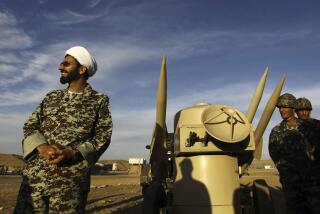Iraq Cuts Rations, Is Accused of Using Food as Weapon
- Share via
BAGHDAD — Iraq has tightened food rationing only two weeks after introducing it in the face of a global trade embargo over its takeover of Kuwait.
The head of the U.N. Security Council’s economic sanctions committee, meanwhile, accused Iraq of using food as a political weapon to break the embargo by deliberately withholding supplies from foreign nationals.
New restrictions announced today by the Iraqi Trade Ministry said each Iraqi citizen will get three daily loaves of Arab-style bread, similar to that sold in the West as pita.
Residents complained that apart from waiting up to three hours in lines for bread in Baghdad’s sweltering heat, each loaf now weighs about 3.2 ounces, compared to about 4.2 ounces before.
But only Iraqis are entitled to ration cards distributed at centers set up by the ruling Baath Party. Thousands of foreigners trapped in Iraq and Iraqi-occupied Kuwait must fend for themselves.
“The information we have is that there is still plenty of food in Iraq but Iraqi authorities are using food as a weapon (and) denied food to foreign nationals,” said Marjatta Rasi, chairman of the U.N. committee to monitor sanctions.
The food is running short for huge numbers of Indians, Filipinos, Bangladeshis, Pakistanis and other Asians who lost their livelihoods when Iraq’s army overran Kuwait Aug. 2. Tens of thousands are stranded in Kuwait, while others fled to Iraq and are waiting repatriation.
Foreigners were not given ration cards, Rasi said hours before the U.N. Security Council approved the shipment of food through the blockade of Iraq and Kuwait in humanitarian cases.
The Security Council resolution passed late Thursday stipulated that emergency food supplies must be distributed through the United Nations in cooperation with the International Committee of the Red Cross and similar bodies.
While there was no immediate official reaction from Baghdad on the resolution, angry private comments from government officials suggested Iraq will reject any firm supervision of supplies as an affront to national sovereignty.
More to Read
Sign up for Essential California
The most important California stories and recommendations in your inbox every morning.
You may occasionally receive promotional content from the Los Angeles Times.










